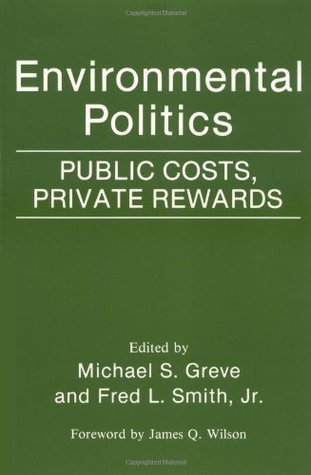Download Environmental Politics: Public Costs, Private Rewards - Michael S. Greve | PDF
Related searches:
But environrnental politics: public costs, private rewards makes clear that ceding all attempts at ending environmental degradation and managing environmental concerns to the government leads to private gain at public expense, and, too often, at the expense of environmental quality.
Create your free account already have an account? login by creating an account, you agree to theterms of service and acknowledge our privacy policy. Log in to your account don't have a benzinga account? create one mexican senators approved.
There is widespread agreement among environmental economists that the total cost to the chinese economy of environmental degradation and resource scarcity is 8%-12% of gdp annually.
Determining the costs of launching a start-up begins with knowing the factors on which to base your estimates. Use these guidelines to help you figure out your business start-up costs.
The environmental and health costs of onshore and offshore oil and gas drilling are also significant, and often unseen. The impacts of unconventional extraction methods, such as natural gas hydraulic fracturing (commonly called fracking) have received much attention, but all methods of oil and gas extraction carry hidden costs.
An environmental economist studies and predicts the impact of environmental events on the local, national, and global economic scales. Environmental economics jobs apply field research data to economic incentives and use the resulting models to assess labor, markets, trading, and outcomes.
The goal of environmental policy is to protect the environment for future generations while interfering as little as possible with the efficiency of commerce or the liberty of the people and to limit inequity in who is burdened with environmental costs.
Apply marginal analysis to illustrate the marginal costs and marginal benefits of reducing pollution.
Hydropower is a renewable source of electricity, but here is why it is not free of environmental costs. Frederic beaudry is an associate professor of environmental science at alfred university in new york.
Environmental policy is the commitment of an organization or government to the laws, regulations, and other policy mechanisms concerning environmental issues. These issues generally include air and water pollution, waste management, ecosystem management, maintenance of biodiversity, the management of natural resources, wildlife and endangered species.
Stay up to date on policy that can impact your savings and investments.
Environmental economics was a major influence on the theories of natural capitalism and environmental finance, which could be said to be two sub-branches of environmental economics concerned with resource conservation in production, and the value of biodiversity to humans, respectively.
The environmental protection agency sent a revised greenhouse gas emissions rule straight to the white house yesterday, but most voters now think regulations like this should travel through.
In political theory, deliberative democracy has been discussed as a political model more compatible with environmental goals. Deliberative democracy is a system in which informed political equals weigh values, information, and expertise, and debate priorities to make decisions, as opposed to a democracy based on interest aggregation.
The business merits of sustainability are based on the fact that even the most ardent climate-sceptic company executives face natural resource costs, public relations problems, regulatory burdens.
For example, a study by the us environmental protection agency, or epa, looked at the costs and benefits of the clean air act from 1970 to 1990.
These policy instruments, such as tradable permits, pollution charges, and deposit- refund systems, are often characterized as “harnessing market forces” because.
Even though we wear cotton almost every day, most of us do not know much about the environmental impacts of cotton cultivation. Frederic beaudry is an associate professor of environmental science at alfred university in new york.
Gests that diffuse environmental benefits and concentrated compliance costs will yield no environmental legislation.
For various reasons, environmental law has always been a flashpoint of controversy. Debates often center on cost, the necessity of such regulations, and the age-old friction between government regulation and encouraging the market to self-regulate and do the right thing for the good of everyone.
For environmental improvement that exist in western countries (public demand, price signals) and central european countries (eu accession requirements).
Chinese environmentalists are successfully mobilizing public opinion on some key environmental issues. In my view, this political development is very similar to the power and force first demonstrated by environmentalists in the united states in the late 1960s and early 1970s.
This study models political costs and uncertainty as a function of project public choice. Behavioral and distributional effects of environmental policy.
Public support for environmental protection: objective problems and subjective values in 43 societies ronald inglehart, university of michigan at ann arbor policies designed to solve environ-mental problems are unlikely to succeed unless they have broad public support, but the motives for mass support are poorly under-stood.
Estimates of the costs of meeting environmental regulations vary widely, from the a gestapo-type government imposing regulations on the american public.
Public perceptions of environmental risks are to a large extent shaped by the media,.

Post Your Comments: